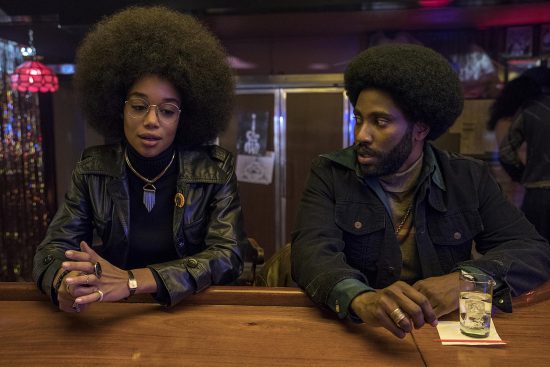Review: BlacKkKlansman – “A very attuned, funny, sickening and entertaining film about racial struggle”
Director: Spike Lee
Writers: Charlie Wachtel, David Rabinowitz, Kevin Willmott, Spike Lee
Starring: John David Washington, Adam Driver, Laura Harrier, Ryan Eggold, Topher Grace, Jasper Pääkkönen, Robert John Burke
Synopsis: Based on the true story of Ron Stallworth (Washington), an African-American cop in Colorado, who infiltrated the local Ku Klux Klan with the help of his white colleague (Driver).
Despite vehement black pride, Spike Lee manages to humanise the personality of a Ku Klux Klan member so brilliantly in BlacKkKlansman, it completely flaws you for a moment. It’s a marital bedtime scene where Jasper Pääkkönen’s Felix chats with his wife about wiping out the black race – it’s disgustingly real, showing a mad wife supporting her insane husband so lovingly. It’s hard to recall a time when this kind of intimate moment with a hardboiled pair of racists has been spotlighted on screen. The fact that it’s a black director drawing out that minutiae shouldn’t matter, but given Lee’s ability to stand up against hate, it’s mature and admirable to see him give us a clearer, rounder picture of events. He can point fingers at the villains, and even make fun of their idiocy, yet to make them seem human is a worthy feat. It’ll be no surprise to his fans to see him pull off a very attuned, funny, sickening and entertaining film about racial struggle, and for those not always following his career path it should highlight once again Lee’s artistic abilities.
BlacKkKlansman sets us in the 1970s, where casual racism and blockades for change still ruled supreme in America. This is a world many of us wouldn’t be unfamiliar with, having read books, seen the news, and watched films for decades – it’s a sad, well-known history. What Lee and his writing team do here, that strikes you more than anything, is the way the 70s eerily blends into modern day. It’s no wonder that moments before the credits we’re audience to newsreel footage of Charlottesville and David Duke (former Grand Wizard of the KKK) from recent times, along with little nods in the dialogue about how certain highly conservative personalities couldn’t reach the presidential seat. These elements both suppress and bring out laughter, as you sit there thinking about how backward things have become. The alt-right morons aren’t just figments of history – they’re in power, trying to regain power, and harbouring the same thoughts and feeling their ancestors have. Of course, none of this is news to us, but Lee’s sly way of reminding you of these things, elevates the film beyond it’s acting, direction and production design.
Speaking of, John David Washington is pitch-perfect in his portrayal of Ron Stallworth. You cannot argue with the plausibility of some scenes, as you witness a very complex and clever person played on screen with no artificiality. Washington blends his style of acting to that of Lee’s subdued direction here; when he does need to add a bit of flair (as does Lee), he nails the tone. Supporting him is the ever-brilliant Adam Driver, who also knows exactly what’s needed for the film in terms of style and inflection. The two characters often seem overshadowed by the right-leaning attitudes of the town, but never seem like a buddy cop duo. It’s a great symbiosis of acting and direction, something that can often be nailed in a Spike Lee movie, or can be misjudged. With the KKK, he draws out brilliant performances from Ryan Eggold, Topher Grace, Jasper Pääkkönen all of whom never become caricatures of their type.
Lee is no stranger to the ‘period piece’, going back in time with plenty of his films, and 70s Colorado isn’t overdone with record drops, elaborate costuming or superfluous hair and make-up. He’s gone for a sombre look to the film, which helps him portray the timelessness that is unfortunately at the crux of the film’s focus. Terrence Blanchard’s score similarly plays faintly in the background, never overstating anything, but giving just the right feel to it all.
At times the film can feel too docile, and even with racial insults and acts of violence, the sense of shock and danger is never 100% felt. The premise of a black man infiltrating the KKK should bring with it heaps of drama, yet this is a different beast. It is trying to show how an organisation carries itself, and emotions that bubble too close to the surface, yet there aren’t many moments where you gasp, or your nails dig into the seat. The true story, in fairness, does not have these elements to them, but as some events have been changed for artistic license, and knowing the criminal cases that the KKK have bled into history, the writers could have added something in to drive how terrorism sits within America, and has for centuries.
It is the end that aims to stay with you, as we see the infamous footage of the Charlottesville attack, and a message of support and condolence for Heather Heyer who died there. The film’s narrative doesn’t tie itself up that well, but the threads that wander from that are knotted in the shots of hit and runs and torch-wielding alt-right morons – those that people like Stallworth couldn’t completely rid America of. It’s the film of a wiser director and writer, and an absolute advocate of Black Power, who wants to spotlight heroes of his race. It’s great to know the film is Lee’s, as it’s hard to imagine anyone else nailing the message and story so well.
BlacKkKlansman is released on August 24th
Special nationwide screenings + Live Satellite Q&A with Spike Lee on August 20th
www.BlackkklansmanScreening.co.uk











